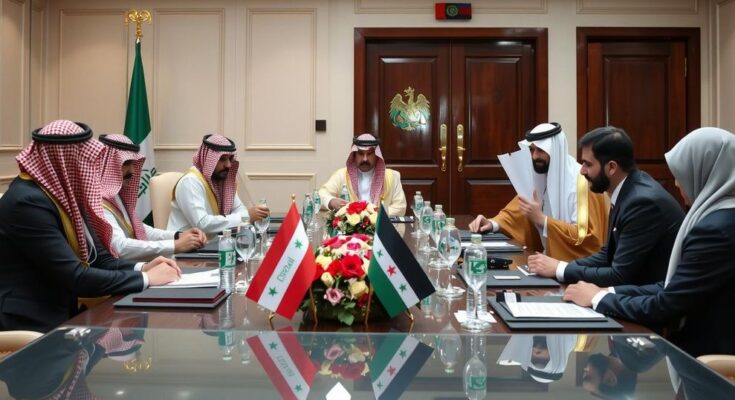Diplomats from the Middle East and Europe gathered in Riyadh to discuss support for Syria following the removal of Bashar al-Assad. The meetings highlighted Saudi Arabia’s shift in stance and its intention to lead regional recovery efforts, contingent on the new Syrian government’s actions regarding inclusivity and minority rights.
Senior diplomats from both the Middle East and Europe convened in Riyadh, Saudi Arabia, for critical discussions concerning support for Syria’s future following the ousting of Bashar al-Assad. These talks included two sessions: one focused on Arab officials and another that welcomed broader participation from international delegations, including representatives from Turkey, France, the European Union, the United Kingdom, and the United Nations. The discussions emerge against the backdrop of Ahmed al-Sharaa’s new leadership as Syria seeks sanctions relief to aid recovery efforts post-conflict.
As the regime of Assad faced widespread condemnation and sanctions imposed since 2011, the European Union expressed a willingness to consider lifting these restrictions should the new Syrian administration take definitive steps toward establishing an inclusive governing body that safeguards minority rights. For over a decade, Syria’s conflict has resulted in profound human costs, with over 500,000 fatalities and millions displaced, including a significant influx to Europe.
Saudi Arabia has recently recalibrated its stance towards Syria, previously severing ties with Assad in 2012, but now engaging more constructively with the new government. This shift reflects the Kingdom’s desire to lead regional endeavors focusing on Syria’s recovery, as emphasized by diplomatic analysts. As Saudi Arabia enhances its contributions, including humanitarian aid, the prospect of diplomatic leverage within Syria grows.
The ongoing meetings continue dialogues initiated in Jordan earlier and highlight regional tensions where countries such as Turkey and Qatar have moved quickly to rejuvenate diplomatic relations with the Syrian administration. However, Saudi Arabia is noted to be proceeding with a more measured approach, seeking to ensure that the new leaders can effectively govern and suppress any extremist factions. The outcome of this strategic summit aims to solidify Riyadh’s influence in a region where Turkey and Qatar currently hold significant sway.
The ongoing crisis in Syria began in 2011 with widespread protests against the Assad regime, which were met with severe government crackdowns, leading to a protracted civil war. The conflict has resulted in extensive human suffering, a devastated economy, and a refugee crisis. Major global powers, especially the United States and the European Union, have imposed sanctions aimed at pressuring the Assad government. Recent developments have included the emergence of a new leadership in Syria under Ahmed al-Sharaa following Assad’s fall, prompting discussions on sanctions and rebuilding efforts, particularly involving Middle Eastern and European nations. Saudi Arabia, having historically opposed Assad, is now reevaluating its approach to engage with the new leadership to facilitate recovery and stability in Syria. This geopolitical shift may alter regional dynamics, as the Kingdom seeks to position itself as a leader in leveraging diplomatic efforts for Syria’s post-war recovery.
The diplomatic discussions held in Riyadh mark a significant shift in international engagement with Syria following the departure of Bashar al-Assad. As Arab and EU officials convene to explore options for support, the focus is not only on humanitarian aid but also on the potential lifting of sanctions contingent upon the new government’s actions. Saudi Arabia’s evolving role signifies a desire for regional leadership, as it navigates complex relationships with emerging powers in post-Assad Syria.
Original Source: www.voanews.com




